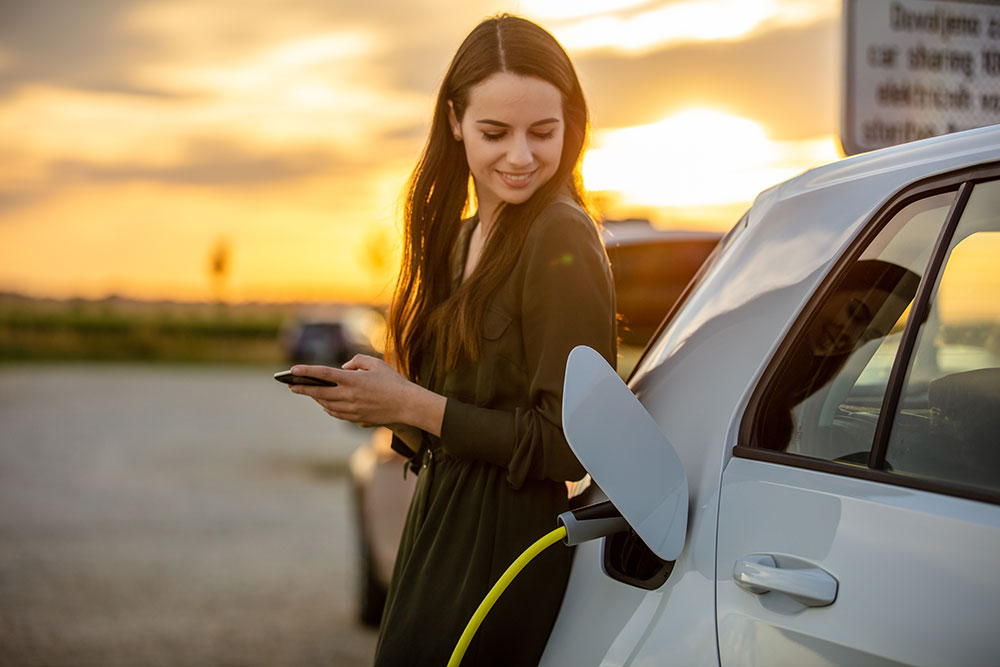Subscribe to drive an EV
How car subscription services are sparking interest in electric vehicles.

Australian car subscription services, like Loopit, are changing the way motorists view traditional car ownership and are giving Queenslanders a taste of driving electric.
As of 31 December 2021, there were 7110 EVs registered in the state with RACQ research* showing high purchase prices and a lack of public charging infrastructure were deterring buyers.
Living in an uncertain world filled with travel restrictions, financial impacts and working from home, it’s fair to say COVID-19 is playing a huge role in deterring people from owning a vehicle in the future or affording to buy an EV outright.
Car subscription allows you to pay a set fee (from as little as $129 per week) to use a particular car for a period of time.
The price may vary with which dealer or model of vehicle you choose however it doesn’t vary when selecting between electric and petrol/diesel vehicles.
This fee covers car ownerships costs such as servicing and maintenance, insurance, registration and roadside assistance and gives you the freedom to change vehicles frequently without the hassle of selling your vehicle.
“Last year was a turning point in the conversation about electric vehicles,” Mr Higgins said.
“Our research shows that the majority of future EV adopters prefer to subscribe rather than buy a car.
“EV buyers are interested in the latest and greatest cutting-edge technology, not just from their vehicles but also from their ownership experience, and subscription makes it easier for drivers to go electric by streamlining the ‘ownership’ process.”
Loopit research showed less than 1% of new cars sold in Australia last year were electric yet 68% of Australians wanted to make the switch to electric in the next five years.
“The car subscription model in Queensland is increasing dramatically,” Mr Higgins said.
“We’re seeing a consistent month-on-month growth of about 10-15%.
“When you own a car, you might change it every three to five years, but with a car subscription you can change your car every few months.
“Car subscription gives you the flexibility to say I’d like to drive a Mazda CX5 now but for my holiday I might like to drive a 4WD and then later, for something fun, I’d like to drive a sportscar.
“Second to that, it’s an all-in-one single payment bundle.
“So, instead of paying registration, car insurance, servicing costs you just pay the one fee.”
Loopit research also showed that 76% of Australians believed car subscription would make EVs more popular by removing the long-term commitment of buying outright.
“I think there are still a lot of unknowns when it comes to EVs,” Mr Higgins said.
“Car subscription allows you to try driving an EV in a very low-risk way before buying one.”
Mr Higgins said major car manufacturers were also showing confidence in the EV market with some committing to go all-electric.
Hertz, one of the world’s largest car rental companies, recently announced the biggest order of EVs – 100,000 Tesla’s.
According to Hertz, the investment will allow the company to accelerate toward future mobility, with plans to eventually transition to a fully electric fleet.
“The huge Hertz order from Tesla was an industry game changer,” Mr Higgins said.
“It said this is a confidence in the space and where we see it going.”
*RACQ Quarterly Omnibus FY22 Q1
Power on with RACQ Roadside Assistance for EVs
Related topics
Things to note
The information in this article has been prepared for general information purposes only and is not intended as legal advice or specific advice to any particular person. Any advice contained in the document is general advice, not intended as legal advice or professional advice and does not take into account any person’s particular circumstances. Before acting on anything based on this advice you should consider its appropriateness to you, having regard to your objectives and needs.
Insurance Products (excluding Travel Insurance) are issued by RACQ Insurance Limited ABN 50 009 704 152 (RACQI) and arranged by its agent, RACQ Distribution Services Pty Ltd (RDS) ABN 35 116 361 650, AFSL 567130 and RDS' authorised representatives (including RACQ Operations Pty Ltd ABN 80 009 663 414, AR No. 234978 (RACQO). Conditions, limits and exclusions apply. RDS and RACQO are in the RACQ group of companies. One of the companies in the RACQ group of companies has a minority shareholding in RACQI.
RDS and RACQO have not taken your personal objectives, circumstances or needs into account when preparing advice regarding insurance products and you will need to consider whether the advice is appropriate for you. Read the Product Disclosure Statement (PDS) and any applicable Supplementary PDS before making a purchase decision on this product. You can also access our Target Market Determinations on this website. RDS receives a commission from RACQI for the policies it arranges. RACQO receives fees paid for services it provides to RDS. Further details about remuneration are available on request prior to purchasing.
Banking and loan products issued by Members Banking Group Limited ABN 83 087 651 054 AFSL/Australian credit licence 241195 trading as RACQ Bank. Terms, conditions, fees, charges and lending policies apply. This is general advice only and may not be right for you. This information does not take your personal objectives, circumstances or needs into account. Read the disclosure documents for your selected product or service, including the Financial Services Guide and the Terms and Conditions, and consider if appropriate for you before deciding.
Except for RACQ Bank, any RACQ entity referred to on this page is not an authorised deposit-taking institution for the purposes of the Banking Act 1959 (Cth). That entity’s obligations do not represent deposits or other liabilities of RACQ Bank. RACQ Bank does not guarantee or otherwise provide assurance in respect of the obligations of that entity, unless noted otherwise.
RACQ Bank subscribes to the Customer Owned Banking Code of Practice which establishes higher standards than the law requires. The Code reflects modern consumer expectations and developments in approaches to issues such as consumer vulnerability, guarantors, and supporting customers through financial hardship. Please read our Customer Owned Banking Code of Practice page for more information.
RACQ Operations Pty Ltd (ABN 80 009 663 414 AR 000234978) and Members Travel Group Pty Ltd (ABN 45 144 538 803 AR 000432492) are acting as an Authorised Representative of the issuer of the insurance, Tokio Marine & Nichido Fire Insurance Co., Ltd. (ABN 80 000 438 291 AFSL 246 548). Any advice set out above is general in nature only, and does not take into account your objectives, financial situation or needs. Before purchasing any travel products, please consider the RACQ Travel Insurance Product Disclosure Statement (PDS) and the Target Market Determinations (TMDs) that apply to these products. Whilst the PDS outlines the Terms and Conditions of these products, the TMDs outline the intended class of customers that comprise the target market for these travel products. This will allow you to consider which products best suit your objectives, financial situation and needs and consider the products appropriateness to your personal circumstances. TMDs also outline matters involving the distribution and the review of these products. The PDS, Supplementary PDS and TMDs for each travel product can be found here.
